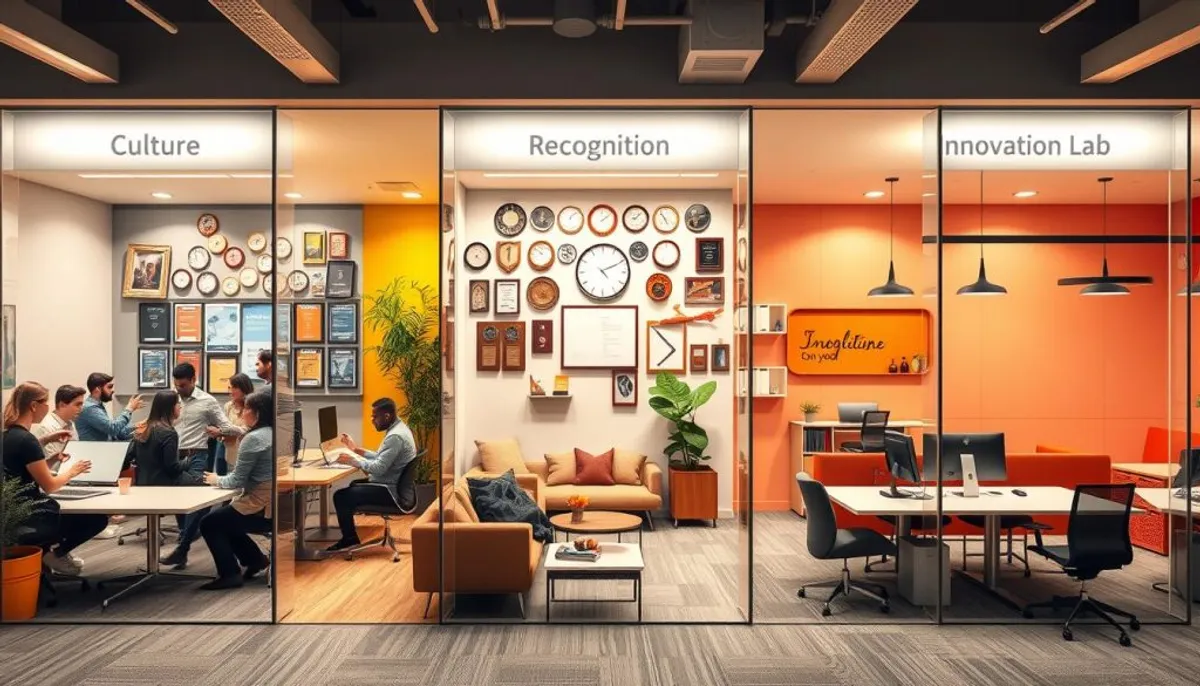
The corporate culture is the central core of any organization. It determines the identity of the company and guides the actions of employees on a daily basis. A rich culture is crucial for the performance and growth of the company.
It is essential to understand the five key components of organizational culture. These components are the history, vision, values, codes, and rituals of the company. They shape a motivating and productive work environment.
In this article, we will closely examine each component. We will demonstrate how they contribute to creating a unique and high-performing corporate culture. Such a culture fosters employee engagement and propels the organization towards success.
What is corporate culture and its strategic importance
Corporate culture is crucial for shaping brand identity and strengthening team cohesion. It consists of the shared values, beliefs, and behaviors within an organization. Its role in performance and growth is undeniable.
Definition and concept of organizational culture
Organizational culture defines the implicit norms that guide daily interactions. It is revealed through rituals, traditions, and the work atmosphere. A Gartner study reveals that only 3 out of 10 HR leaders believe their company has the culture necessary to improve its performance.
Impact on the performance and growth of the company
A strong culture boosts employee engagement and productivity. It encourages innovation and adaptability in the face of change. Companies like Google and Decathlon, with a strong culture, demonstrate superior financial performance and reputation.

Role in developing the employer brand
The culture plays a vital role in attracting and retaining talent. It helps create an attractive employer brand, which is essential in a competitive labor market. A culture aligned with employees' values reinforces their sense of belonging and loyalty.
| Component | Impact on the company |
|---|---|
| Shared values | Strengthened team cohesion |
| Company rituals | Increased sense of belonging |
| Transparent communication | Improved trust and engagement |
| Encouraged innovation | Enhanced adaptability and growth |
What are the 5 components of corporate culture
Corporate culture is formed by essential elements that define its identity and functioning. These components directly influence performance and employee engagement. They play a crucial role in the organization's success.
The history and founding myth
The founding myth is the foundation of corporate culture. It tells the origin of the organization and inspires employees. This shared story creates a sense of belonging and pride.
The vision and common goals
The company goals guide daily actions. A shared vision motivates teams and gives meaning to work. 92% of freelancers chose this status to align their work with their personal values.
The core values
The organizational values define the DNA of the company. They influence decisions and behaviors at all levels. 44% of employees in psychological distress emphasize the importance of strong values.
The codes and rules of conduct
The rules of conduct frame professional interactions. They ensure consistency and efficiency within the organization. One in two people practice quiet quitting, highlighting the importance of clear rules.
The company rites and traditions
The company traditions strengthen bonds among employees. They create moments of sharing and conviviality. These rituals contribute to team cohesion and the transmission of values.
| Component | Role in culture | Impact on the company |
|---|---|---|
| Founding myth | Creates a sense of belonging | Strengthens brand identity |
| Common goals | Gives meaning to work | Improves collective performance |
| Core values | Guides behaviors | Encourages employee engagement |
| Rules of conduct | Frames interactions | Ensures operational efficiency |
| Company traditions | Strengthens social ties | Develops team cohesion |
The role of values in identity building
Core values are at the heart of a company's identity. They guide behaviors, shape culture, and influence employee engagement. A study from Lumière University - Lyon 2 in 2007 revealed a major shift in the priorities of French workers.
Today, the balance between professional and personal life is more important than professional success. This evolution transforms how companies are built. The charter of values becomes a key tool for aligning individual aspirations with the organization's objectives.

In response to increasing turnover and declining loyalty, companies seek to strengthen their culture. Akerlof and Kranton's economic model shows the link between motivation and corporate culture. An identity built on authentic values fosters engagement and performance.
| Component | Impact on identity | Benefit for the company |
|---|---|---|
| Core values | Guides behaviors | Team cohesion |
| Charter of values | Clarifies expectations | Strategic alignment |
| Corporate culture | Reinforces belonging | Talent retention |
In conclusion, values are essential for building a strong and attractive company identity. They create an environment where employees feel valued and involved. This contributes to the overall performance of the organization.
How to implement a strong corporate culture
A solid corporate culture is crucial for attracting and retaining talent. Statistics show that 20% of candidates prefer a job offer based on the company's values rather than another. To establish this culture, three aspects are essential.
Internal communication strategies
Internal communication is the foundation of a robust corporate culture. It allows sharing the company's values and vision. Organizing regular meetings, launching an internal newsletter, and using collaborative tools are key strategies. These methods strengthen cohesion and engagement within the team.
Employee involvement
Employee engagement is paramount. 82% of employees view corporate culture as a major criterion for choosing their employer. Involving teams in decisions, encouraging their initiatives, and valuing their contributions are essential. This creates a sense of belonging and strengthens the company's culture.
Maintaining and evolving the culture
Corporate culture should not be static. It must adapt to its environment. Listening to feedback, adjusting practices, and staying true to core values are key steps. This cultural evolution ensures the sustainability of a strong and adapted culture.
| Indicator | Impact |
|---|---|
| Absenteeism | Decrease of 20% |
| Turnover | Decrease of 20% |
| Productivity | Increase of 15% |
These data illustrate the positive impact of a strong corporate culture on performance. Investing in culture is investing in the sustainable success of the company.
Conclusion
Corporate culture represents an invaluable strategic asset for any organization. It profoundly influences the company's identity, improves performance, and increases employee engagement. The benefits of this culture are numerous and beneficial for all aspects of the organization.
A strong corporate culture attracts and retains the most qualified talent. It creates an environment where integrity, innovation, and respect are paramount. These values encourage trust, stimulate creativity, and value individual contributions. Rituals and traditions reinforce the sense of belonging, while a clear vision motivates teams towards common goals.
Creating a strong corporate culture takes time, typically 3 to 5 years. It requires open communication, opportunities for professional development, and recognition of successes. Harmonizing culture, objectives, and corporate strategy is essential to ensure success. Ultimately, a well-established corporate culture is a pillar of performance and sustainable growth.
RelatedRelated articles


